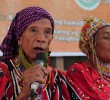So the threat that has come is not confined to Sri Lanka alone. The threat in terms of the economies of our countries and that of the world is getting threatened and that is what we want, international cooperation in arresting that. Also, a particular indication that has been addressed to me by the chair that how much it has affected Sri Lanka subsequently because Tigers claim certain sections of the seafront associated with the land. We deny that there is any claim on that, but at the same time they are holding on to two and a half districts of the country today. The east we have been able to liberate totally from the Tiger control and two and a half districts in the north, covering both the east coast and that on the west coast do affect our economy pursuits.
Today we are about to announce the licences for the oil exploration, all the eight blocks have been carved out in the Calvary Bay on the West Coast of the Sri Lanka, on the north-west coast of Sri Lanka, and that has an implication. We do not have safe passage and safe seas surrounding us. That affects the exploratory operations by other foreign bidders and foreign takers. So we want peace and both peace at water as well as on land, and to as which we need cooperation. Only two blocks have been given, one to China, and the other one to India. So we want these governments to move in fast and take control of this location and start off with the operations because we need that for our economy.
These are new areas of economy. Our tourism, yes, has got affected because of terrorism, but we have been able to manage it. We still sustain the normal arrival rates for Sri Lanka, but our GDP is great, 7.3% in 2006. Our exports have grown because we have remained resilient to all of the internal shocks, both internal as well as external in today�s context. But we have been managing the economy but we can do better in the absence of this menace affecting Sri Lanka. I think the 30 years have taken a long toll, but at the same time 30 years of this menace has taught us several lessons. One is to call terrorists �terrorists� and meet that challenge, at the same time have a political process and a greater dialogue through a democratic agenda. That is how we approach it. Sri Lanka, both politically, economically and from a military context. Thank you.
Dr John Chipman
Then if each of you could just take 30 seconds to address this question of how you see the quality of intelligence showing on this issue, minister.
Rohitha Bogollagama
There is an existing intellects program among the intelligence chiefs and not only that, in matters of extreme necessity. The ships of our navies are in contact, they can just lift the telephone and what we do not see is the coordination among the different ships of the national police of the ASEAN nations that provide additional information especially the information that relates to terrorism and other related intelligence.
Professor Juwono Sudarsono
The biggest problem is sharing human intelligence, but societies of each of the Asian countries, we lack knowledge about the internal dynamics of the Philippines, Cambodia, I think they�re working now at that level. I think military and electronic intelligence is fine, but I believe there is much more need for importance in understanding human intelligence, what makes a society tick, what makes people at a certain level in society lead to desperation and lead to violent acts of terror. We all agree on three principle reasons for terrorism.
One is inequities in development, second is corruption with leaders in both Government and business, and third is poverty. If we can get an understanding of resource societies about human intelligence, I think we will do much better in the long run. Thank you.
Dr John Chipman
Minister, thank you very much. On behalf of all the delegates here, can I thank the three ministers for their excellent statements and the discussion also that followed. I think again we have achieved at the Shangri-La Dialogue a better understanding at least of the widening challenges at maritime security, but also the specific steps that can be taken to meet them. Thank you very much indeed.










